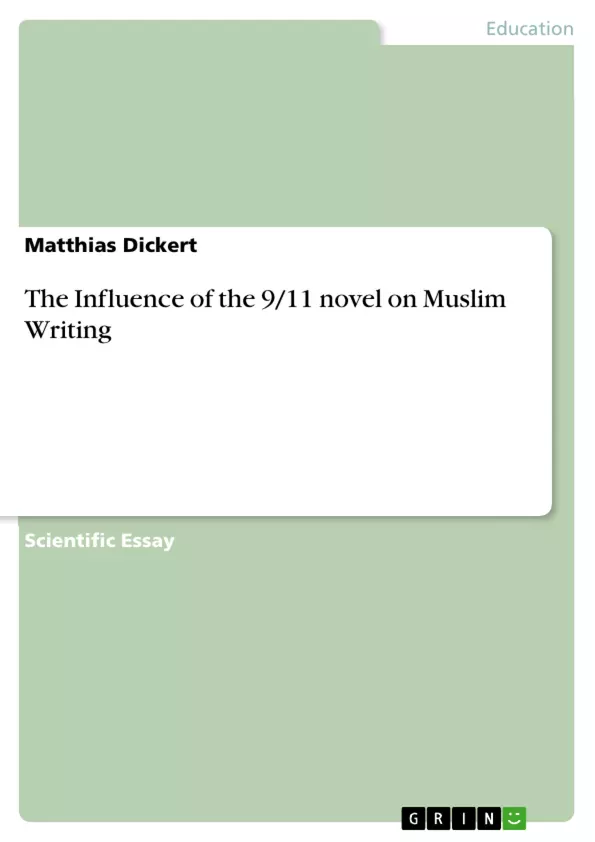Since 9/11 many Muslims struggle with their identity and are exposed to xenophobia, violence, vicious defamation, harassment or displacement. In short the notion 'Muslim' in relation to that day has become a stigma. It is against this background and the post-traumatic aftermath of September 11, 2001 where many novelists disposing of a Muslim background wrote their novels. The logical consequence from this was that Muslim writing as such has become more complex stressing the standpoints of hearer and teller as elements of distortion. Interesting though is the fact that some novels dealing with Islam and Muslim characters have taken up and used the Oriental stereotypes where Muslims are - according to Said - seen as 'either oil suppliers or potential terrorists'.
For a long time Muslim characters in literature have been connected to this negative image which Said also labels as 'other' and Spivak as 'subaltern'.
The 'hybrid' in which many Muslim characters are often set is also (still) equated with the 'exotic' thus ignoring the energy of Bhabha' s term and its positive realizations in fiction.
It is therefore one aim of this essay to throw light on this matter and to shortly reflect the present influence of 9/11 on Muslim writing.
Table of Contents
- Abstract
- Migrant Writing as a Major Element of Contemporary English Speaking Literature of the Last Five Decades
- Terrorism (to which 9/11 belongs) can thus be seen as an element of criticism or attacks on a (seemingly) tyrannizing state which fundamentalists like to replace with an even more terrorizing regime.
- Within the very short timespan of sixteen years the 9/11 novel has developed into a contested and troubled genre because 9/11 was (and is) more than a historical event, it is a setting which itself started an explosion of fiction that wasn't necessarily to have been.
- All this showed, however, that the 9/11 topic of fiction is of special quality and need because novelists want to reanimate reality.
- The wide employment of 9/11 as a literary element in many contemporary novels disposing of a Muslim background does not necessarily mean that critics talk about a new genre of the terrorist novel, the historic novel, the political novel or a new type of detective novel but it definitely hints at this manifold employment of 9/11 as a literary element.
Objectives and Key Themes
This essay aims to examine the influence of the September 11th attacks on Muslim writing, particularly in terms of how the event has impacted the portrayal of Muslim characters and identity in contemporary literature. The essay seeks to understand the complexities of representing Muslim experiences in the aftermath of 9/11, and to explore the role of fiction in addressing themes of trauma, migration, and cultural identity.
- The impact of 9/11 on Muslim identity and its representation in literature.
- The intersection of religion, migration, and identity in contemporary writing.
- The role of fiction in navigating trauma, memory, and cultural conflict.
- The use of Oriental stereotypes and the "othering" of Muslim characters in post-9/11 literature.
- The emergence of "9/11 novels" as a distinct genre and its significance in contemporary literary discourse.
Chapter Summaries
- The abstract introduces the essay's focus on the influence of 9/11 on Muslim writing, highlighting the challenges and complexities faced by Muslim writers in the post-9/11 era.
- The second chapter explores the connection between migrant writing and themes of trauma, migration, assimilation, diaspora, and identity. It emphasizes the role of religion as a key identity marker, especially for Muslim writers navigating cultural differences and resistance.
- The third chapter delves into the representation of terrorism and its relationship to the "War on Terrorism." It examines how Muslim writers have grappled with the negative portrayal of Islam and Muslims, often using fiction to explore the complexities of identity and conflict.
- The fourth chapter highlights the development of the "9/11 novel" as a distinct genre, showcasing prominent examples and exploring its significance as a response to the historical event and its cultural repercussions.
- The fifth chapter analyzes the impact of 9/11 on the literary landscape, arguing that it has fostered a greater awareness of the importance of representing Muslim experiences and navigating the challenges of cultural understanding.
Keywords
The primary keywords and focus topics of the essay are 9/11, Muslim writing, migrant literature, identity, trauma, Islamophobia, terrorism, postcolonialism, Orientalism, representation, and the "other." These keywords highlight the essay's central concerns with understanding the intersections of religion, culture, politics, and literature in the wake of a significant historical event.
Frequently Asked Questions
How did the 9/11 attacks influence Muslim writing?
The attacks led to a surge in literature addressing Muslim identity, xenophobia, and the "stigma" attached to being Muslim in a post-9/11 world, making the narratives more complex and political.
What is the "9/11 novel" genre?
It is a genre of fiction that uses the events of September 11, 2001, as a central theme or backdrop to explore trauma, cultural conflict, and the changing global political landscape.
How are Muslim characters often portrayed in post-9/11 literature?
Many novels grapple with Orientalist stereotypes, where characters are often reduced to being "potential terrorists" or "others," though many writers use fiction to challenge these narrow views.
What roles do "hybridity" and "orientalism" play in these novels?
Hybridity reflects the dual identity of many Muslim characters living in the West, while Orientalism refers to the stereotypical representation of the East by Western literary traditions.
Who are the key theorists mentioned in this context?
The essay references Edward Said (Orientalism), Gayatri Spivak (subaltern studies), and Homi Bhabha (hybridity) to analyze the literary representation of Muslims.
- Quote paper
- Dr. Matthias Dickert (Author), 2017, The Influence of the 9/11 novel on Muslim Writing, Munich, GRIN Verlag, https://www.grin.com/document/375653



